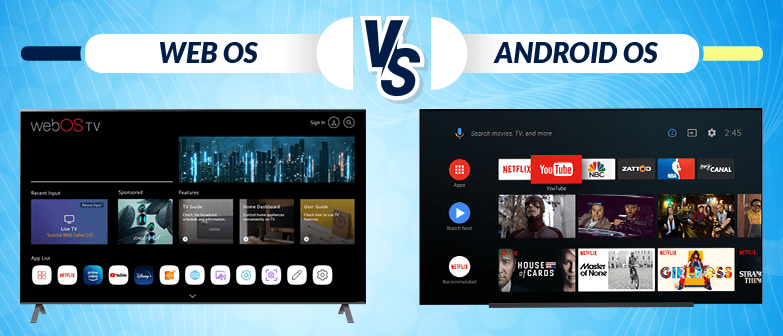With smart TV operating systems, two of the most popular options are WebOS and Android TV. Both offer a range of features and benefits, but which one is the better choice for you? In this article, we’ll take an in-depth look at the similarities and differences between WebOS and Android TV, so you can make an informed decision.
A simple push of a button is all it takes to access a menu containing the most popular apps and TV features. While both WebOS and Android TV share some common features, they differ significantly from each other.
Regardless of your area of interest, whether you’re in the streaming industry or simply enjoy streaming shows on a smart TV, it’s essential to grasp the distinctions between WebOS and Android TV in order to make an informed decision.
This blog helps to provide a clear overview of these two systems. So, let’s delve into what sets them apart.
What is WebOS?
WebOS is an operating system designed for smart TVs and other devices, developed and owned by LG Electronics. It was first introduced in 2009 and has since been used on a range of LG smart TVs, as well as some other devices such as smartwatches and refrigerators.
WebOS offers a range of features and benefits, including a user-friendly interface, support for a variety of streaming services and apps, and advanced voice control options.
What is Android TV?

Android TV is an operating system designed for smart TVs and streaming boxes, developed and owned by Google. It was first introduced in 2014 and has since been used on a range of TVs and devices from various manufacturers, including Sony, TCL, and NVIDIA.
Like WebOS, Android TV offers a range of features and benefits, including access to a variety of streaming services and apps, as well as support for Google Assistant and voice control. It also offers a customizable home screen, allowing users to personalize their TV experience with their favorite apps and content.
Comparison Of WebOS and Android TV
User Interface
The user interface is an essential aspect of any operating system, including those for smart TVs. WebOS has a clean, minimalist interface that is easy to navigate, with icons that are clear and easy to understand. Android TV, on the other hand, has a more traditional layout that is similar to other Android devices, with a focus on customization and personalization.
App Selection
Both WebOS and Android TV offer a vast selection of apps, including popular OTT streaming services such as Netflix, Hulu, and Amazon Prime Video. However, Android TV has a larger selection of apps overall, including more gaming and productivity apps than WebOS.
Performance and Speed
In terms of performance and speed, both operating systems are relatively comparable, but Android TV has the edge in multitasking. Android TV allows you to switch between apps quickly and easily, while WebOS can be slower to respond when switching between apps.
Read More: A Comparison of H.264 vs H.265 : Which Codec is Right for You?
Voice Control
Both WebOS and Android TV offer voice control options, allowing you to use your voice to search for content, change channels, and adjust settings. However, Android TV has more advanced voice control capabilities, including the ability to control your smart home devices with your voice.
Device Integration
Both operating systems offer a range of device integration options, allowing you to connect your smart TV to other devices and services. However, Android TV has a more extensive range of integration options, including Google Assistant and Chromecast.
Gaming Capabilities
If you’re a gamer, you may be interested in the gaming capabilities of these operating systems. Android TV has a more extensive selection of games available, including many popular titles. However, WebOS offers a better overall gaming experience, with smoother gameplay and fewer bugs and glitches.
Privacy and Security
In privacy and security, both operating systems offer robust security features to protect your personal information. However, WebOS has an edge in this area, with a more privacy-focused approach and more transparent data collection practices.
Pricing and Availability
WebOS is available on LG smart TVs, while Android TV is available on a wide range of smart TVs from various manufacturers, including Sony, TCL, and Hisense. To price, they typically include both operating systems with the cost of the TV.
Conclusion
In conclusion, both WebOS and Android TV offers a range of benefits and features, and the best choice for you will depend on your specific needs and preferences. If you value a clean, minimalist interface and better gaming performance, WebOS may be the better choice. However, if you’re looking for a more extensive selection of apps, better voice control options, and more advanced device integration, Android TV may be the better option for you.
Frequently Asked Question’s(FAQ)
1. What is WebOS?
WebOS is a Linux-based operating system developed by LG Electronics, primarily for its smart TVs. It is designed to provide a user-friendly interface and features like multi-tasking, voice recognition, and screen sharing.
2.What is Android TV?
Android TV is a smart TV platform developed by google, based on the android operating system. It offers a variety of features like Google Assistant integration, voice search, and access to various streaming services.
3. What are the main differences between WebOS vs Android TV?
One of the main differences between WebOS and Android TV is that WebOS offers a simpler, more user-friendly interface, while Android TV provides more customization options and access to the Google Play Store for a wider range of apps. Additionally, WebOS offers support for more audio and video codecs, while Android TV offers better integration with other Google products like Chromecast.
4.Can WebOS and Android TV be used interchangeably?
However, both platforms offer similar functionality for streaming content, accessing apps, and controlling smart home devices.
5.Which operating system is better for smart TVs, WebOS or Android TV?
The choice between WebOS and Android TV ultimately depends on personal preferences and requirements. WebOS may be preferred for its simplicity and ease of use, while Android TV may be preferred for its wider range of customization options and integration with Google services.
6. Which is better, WebOS or Android TV?
This depends on personal preference and the specific features that matter most to you. Both operating systems offer a range of benefits and features, so it’s worth considering the specific models and manufacturers that offer each system and comparing them to determine which is the best fit for you.


